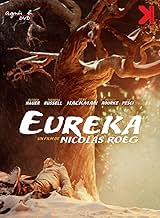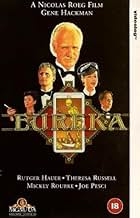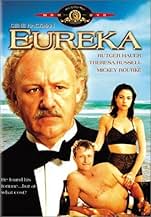CALIFICACIÓN DE IMDb
5.9/10
4.2 k
TU CALIFICACIÓN
En 1925, un solitario y obsesionado buscador de oro en el Ártico, Jack McCann, encuentra por fin oro. Veinte años después, empieza a perder el control cuando su única hija se compromete con ... Leer todoEn 1925, un solitario y obsesionado buscador de oro en el Ártico, Jack McCann, encuentra por fin oro. Veinte años después, empieza a perder el control cuando su única hija se compromete con un hombre que le desagrada profundamente.En 1925, un solitario y obsesionado buscador de oro en el Ártico, Jack McCann, encuentra por fin oro. Veinte años después, empieza a perder el control cuando su única hija se compromete con un hombre que le desagrada profundamente.
- Dirección
- Guionistas
- Elenco
- Premios
- 1 nominación en total
- Dirección
- Guionistas
- Todo el elenco y el equipo
- Producción, taquilla y más en IMDbPro
Opiniones destacadas
Roeg draws on Who Killed Sir Harry Oakes, as well as Skakespeares tempest and some Robert Service to create this tale of a man who "once had the world, now i just have the everything". a film of thems and more subplots than plot-and many themes. hackmann is a perfect Roeg actor-like Sutherland, Fox and Bowie, but some other performances are not as comfortable, or not as well written -particularly the women. A film that is worth repeated viewing
The Latter-Half of Nicolas Roeg's Filmography. A Career that Started On-Fire and Slowly Fizzled. Critics and Fans Did Not Associate or Relate to "Eureka" Fringy-Style and Off-Kilter Tone...Despite Similar Roeg Movies that Created the Buzz for the Cinematographer/Technician Turned Director in the First Place..."Performance" (1970)..."Walkabout" (1971)..."Don't Look Now" (1973)..."The Man Who Fell To Earth" (1976)..."Bad Timing" (1980)...
This String of Successful Out of the Box Offerings from Director Roeg is a Remarkable (both Critical and Financial) of Consistency that Hit a Chord. But Starting with "Eureka (1980) His Charm, Suddenly, No Longer Did the Trick and the Remainder of His Output is Considered, with Few Exceptions, Mediocre or just Bad.
"Eureka" became the "Kryptonite" for Roeg and He Never Seemed to Attain the "Magic" Again.
It's More Over-the-Top Disturbing. More Violent, More Decadent, More Outrageous Behavior, More of Everything. It's Still Roeg, but Roeg On Steroids Losing His Mind...
Unrestrained, Far From Grounded in Reality. Shocking Scenes, Including a Voodoo Ritual that Pulls No Punches, Sex, Ultra-Violent, and Disgusting Images.
A Dream Cast,,,Including Gene Hackman, Theresa Russell, Rutger Hauer, Joe Peci, Jane Laprtaire...
that All Seemed to Capitulate to the Rogue Roeg's Vision, of a Surreal Early 20th Century and the Monied Elite that Literally Lives on Their Own Private Island.
Nicolas Roeg, perhaps Guilty of Over-Reach that Pleased No One, and the Movie is Unsettling and Disturbing to Watch...but it's a Train-Wreck that has that Train-Wreck Allure that is Magnetism of "Rubber-Necking" and a "Guilty Pleasure" Watching the Dark-Side of Humanity that Contains Very Little Light.
Sounds Like a "Cult-Movie' Personified, but it's Not a Cult Movie Yet and is Mostly a Forgotten Misfire that Never Made its Mark, is Virtually Unknown, a Mystery Considering what's On and Behind the Screen. As Joe Pesci says in Oliver Stone's JFK..."It's a mystery wrapped in an Enigma"...By the Way...Pesci Plays, What Else? A Gangster and Nemesis to the Unhinged "Richest Man in the World"...Gene Hackman
The Movie Deserves A Closer Look, just because of All the Talented Folks that Put Together this "Crazy Man's Quilt. A Fascinating, if Bizarre and a Turn-Off for Most Folks. But Nonetheless an Artistic Experiment that is... Worth a Watch.
This String of Successful Out of the Box Offerings from Director Roeg is a Remarkable (both Critical and Financial) of Consistency that Hit a Chord. But Starting with "Eureka (1980) His Charm, Suddenly, No Longer Did the Trick and the Remainder of His Output is Considered, with Few Exceptions, Mediocre or just Bad.
"Eureka" became the "Kryptonite" for Roeg and He Never Seemed to Attain the "Magic" Again.
It's More Over-the-Top Disturbing. More Violent, More Decadent, More Outrageous Behavior, More of Everything. It's Still Roeg, but Roeg On Steroids Losing His Mind...
Unrestrained, Far From Grounded in Reality. Shocking Scenes, Including a Voodoo Ritual that Pulls No Punches, Sex, Ultra-Violent, and Disgusting Images.
A Dream Cast,,,Including Gene Hackman, Theresa Russell, Rutger Hauer, Joe Peci, Jane Laprtaire...
that All Seemed to Capitulate to the Rogue Roeg's Vision, of a Surreal Early 20th Century and the Monied Elite that Literally Lives on Their Own Private Island.
Nicolas Roeg, perhaps Guilty of Over-Reach that Pleased No One, and the Movie is Unsettling and Disturbing to Watch...but it's a Train-Wreck that has that Train-Wreck Allure that is Magnetism of "Rubber-Necking" and a "Guilty Pleasure" Watching the Dark-Side of Humanity that Contains Very Little Light.
Sounds Like a "Cult-Movie' Personified, but it's Not a Cult Movie Yet and is Mostly a Forgotten Misfire that Never Made its Mark, is Virtually Unknown, a Mystery Considering what's On and Behind the Screen. As Joe Pesci says in Oliver Stone's JFK..."It's a mystery wrapped in an Enigma"...By the Way...Pesci Plays, What Else? A Gangster and Nemesis to the Unhinged "Richest Man in the World"...Gene Hackman
The Movie Deserves A Closer Look, just because of All the Talented Folks that Put Together this "Crazy Man's Quilt. A Fascinating, if Bizarre and a Turn-Off for Most Folks. But Nonetheless an Artistic Experiment that is... Worth a Watch.
I remember watching this movie a couple of times on cable over a decade ago. I don't know if it was supposed to be a mystery or noir but one of the things that struck me was the poor picture (perhaps it was intentional to keep up the mystery)
Generally, the actors did a very good job. I just feel the script was poor.
Rarely has a film had so much potential, that goes unrealized. Gene Hackman and his gold discovery is beautifully photographed, yet so unlikely and unrealistic, that it seems surreal. From the moment things shift to the island, the movie plays like a beautiful montage, with story continuity only an afterthought. It becomes merely a series of images strung together with philosophical messages, huge time jumps, flashbacks, and metaphysical nonsense. Yet, the images of ultra violence, nudity, snow, gold flakes, and the Victorian splendor, will linger long after the movie ends. From that standpoint at least some of "Eureka"s potential is realized, but not enough to grab the greatness that was within grasp. - MERK
Of the Nicolas Roeg films I've seen thus far "Eureka" is in many ways the most conventional. Probably this is due to its being based on real-life events, to wit, the horrific murder in his palatial house of a powerful and super-wealthy man just as the Second World War is nearing its close.
Before we get to that, there's an eerie, atmospheric prologue set in the Yukon twenty years earlier where Gene Hackman's Jack McCann character achieved his one goal in life, to strike gold and become rich beyond his wildest dreams. Fast forward those twenty years and he's married to his now dissolute wife, Jane Lapotaire with an impulsive adult daughter, played by Theresa Russell, waited on hand and foot, living the life of luxury on his own private island in the Bahamas named Eureka after the word he uttered when making his lucky strike.
But of course, great wealth doesn't guarantee great happiness and so Jack's peace of mind is beset on two fronts. Firstly his impressionable daughter has fallen in with a handsome, libertine go-getter, Rutger Hauer's titled Frenchman Claude van Horn. Jack thinks Claude is literally a gold-digger and is provoked to extreme rage and violence against him when he learns the couple have secretly married. His other concern is that he's being pressurised by his up till now trusted business partner who's now in tow to a shady mobster who wants to open up Eureka to gambling, like a second Cuba.
How this self-made man confronts head-on both of these problems and the disastrous consequencies which follow, determines the outcome of the movie, culminating in his horrific killing and the subsequent trial of van Horn, the verdict coincidentally falling due on the day the war actually ends.
Like I said, this Roeg film is perhaps easier to follow than others in his catalogue, but naturally he throws in a few curve-balls along the way and elsewhere demonstrates his undoubted directorial bravura. The depictions of sex and violence are graphic, especially the drunken orgy scene masterminded by van Horn and the nightmarish slaying of McCann in his own bed but these are contrasted with the opulent depiction of the trappings of wealth and the matter-of-fact gravity of the extended courtroom trial.
I personally felt that rather like McCann himself, the film peaks at the moment he hits the motherlode, in a remarkably staged scene with McCann literally awash in his new wealth. There are strong performances by Hackman, and Hauer, in particular with Joe Pesci warming up on the sidelines for his future gangster roles under the direction of Scorcese.
Yes, the film is uneven with occasionally overripe dialogue and some confusing plot-shifts but it certainly works as a study of greed, power and the corruption of wealth.
Perhaps the moral here is that it's better just to let the rainbow fade rather than chase the pot of gold you imagine is at the end of it.
Before we get to that, there's an eerie, atmospheric prologue set in the Yukon twenty years earlier where Gene Hackman's Jack McCann character achieved his one goal in life, to strike gold and become rich beyond his wildest dreams. Fast forward those twenty years and he's married to his now dissolute wife, Jane Lapotaire with an impulsive adult daughter, played by Theresa Russell, waited on hand and foot, living the life of luxury on his own private island in the Bahamas named Eureka after the word he uttered when making his lucky strike.
But of course, great wealth doesn't guarantee great happiness and so Jack's peace of mind is beset on two fronts. Firstly his impressionable daughter has fallen in with a handsome, libertine go-getter, Rutger Hauer's titled Frenchman Claude van Horn. Jack thinks Claude is literally a gold-digger and is provoked to extreme rage and violence against him when he learns the couple have secretly married. His other concern is that he's being pressurised by his up till now trusted business partner who's now in tow to a shady mobster who wants to open up Eureka to gambling, like a second Cuba.
How this self-made man confronts head-on both of these problems and the disastrous consequencies which follow, determines the outcome of the movie, culminating in his horrific killing and the subsequent trial of van Horn, the verdict coincidentally falling due on the day the war actually ends.
Like I said, this Roeg film is perhaps easier to follow than others in his catalogue, but naturally he throws in a few curve-balls along the way and elsewhere demonstrates his undoubted directorial bravura. The depictions of sex and violence are graphic, especially the drunken orgy scene masterminded by van Horn and the nightmarish slaying of McCann in his own bed but these are contrasted with the opulent depiction of the trappings of wealth and the matter-of-fact gravity of the extended courtroom trial.
I personally felt that rather like McCann himself, the film peaks at the moment he hits the motherlode, in a remarkably staged scene with McCann literally awash in his new wealth. There are strong performances by Hackman, and Hauer, in particular with Joe Pesci warming up on the sidelines for his future gangster roles under the direction of Scorcese.
Yes, the film is uneven with occasionally overripe dialogue and some confusing plot-shifts but it certainly works as a study of greed, power and the corruption of wealth.
Perhaps the moral here is that it's better just to let the rainbow fade rather than chase the pot of gold you imagine is at the end of it.
¿Sabías que…?
- TriviaDirector Nicolas Roeg has said of this movie: "I was initially interested in a character who wanted to satisfy an all-consuming desire...'that's what I want'...but when he gets it what happens after his brief ecstatic moment? Nothing more than left over life to kill."
- ErroresJack McCann's discovery of the gold is several times said to take place in the winter of 1925. At this time, McCann has no family and is a complete loner. Yet, when the film moves forward to 1945, he has a married daughter who is said to be twenty years old in the early part of 1945. Her mother, McCann's wife, is an aristocratic Englishwoman who has married him for his money, and who therefore cannot have married him before 1926 at the earliest, which makes the daughter unlikely to be more than 18 in the 1945 scenes. Theresa Russell, who plays the daughter, was in her late twenties when the film opened.
- Citas
Jack McCann: Once I had it all. Now I just have everything.
- Versiones alternativasAlthough the UK cinema version was intact the 1986 Warner video release was missing 7 seconds from the death of Jack McCann, notably shots of a flame thrower being run over his body and face. These were not cut by the BBFC so presumably they were distributor edits. DVD releases are fully uncut.
- ConexionesFeatured in Loose Talk: Episode #1.7 (1983)
Selecciones populares
Inicia sesión para calificar y agrega a la lista de videos para obtener recomendaciones personalizadas
- How long is Eureka?Con tecnología de Alexa
Detalles
- Fecha de lanzamiento
- Países de origen
- Sitio oficial
- Idioma
- También se conoce como
- River of Darkness
- Locaciones de filmación
- Productoras
- Ver más créditos de la compañía en IMDbPro
Taquilla
- Total en EE. UU. y Canadá
- USD 123,572
- Total a nivel mundial
- USD 123,572
Contribuir a esta página
Sugiere una edición o agrega el contenido que falta

































